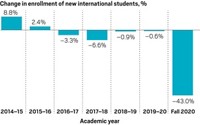Advertisement
Grab your lab coat. Let's get started
Welcome!
Welcome!
Create an account below to get 6 C&EN articles per month, receive newsletters and more - all free.
It seems this is your first time logging in online. Please enter the following information to continue.
As an ACS member you automatically get access to this site. All we need is few more details to create your reading experience.
Not you? Sign in with a different account.
Not you? Sign in with a different account.
ERROR 1
ERROR 1
ERROR 2
ERROR 2
ERROR 2
ERROR 2
ERROR 2
Password and Confirm password must match.
If you have an ACS member number, please enter it here so we can link this account to your membership. (optional)
ERROR 2
ACS values your privacy. By submitting your information, you are gaining access to C&EN and subscribing to our weekly newsletter. We use the information you provide to make your reading experience better, and we will never sell your data to third party members.
The article “Promoting Diversity Through Conversation” raises substantive issues on challenges and opportunities faced by naturalized American scientists and affords the American Chemical Society an opportunity to exert its leadership role to reaffirm our commitment to merit-based equal opportunity, globalization, and competitiveness in science and technology worldwide (C&EN, June 14, page 49).
Reliable estimates put the percentage of the ACS naturalized and/or foreign-born members at up to 25% of the 161,000 total membership. Therefore, a comprehensive regression analysis of these cohorts and their representation in mid- to upper management in their respective institutions, corporations, government agencies, and within ACS professional staff is overdue.
For instance, one can hardly identify a single academic department in science and engineering nationwide where more than 25% percent of its faculty members are not naturalized citizens. By contrast, their presence as department chairs or above is less than a few percent. The same disproportion can be substantiated in government agencies, where security clearance protocols frozen in place during the Cold War prevent them from obtaining the security clearances required for appointment.
The above notwithstanding, the gap between the substantial cohorts of scientists and chemists at all corporate levels has much improved in the past decade or so. What I share herein is not necessarily anecdotal in nature or scope, but rather a reflection of ongoing conversations with thousands of colleagues over the years.
David N. Rahni
New York City



Join the conversation
Contact the reporter
Submit a Letter to the Editor for publication
Engage with us on Twitter